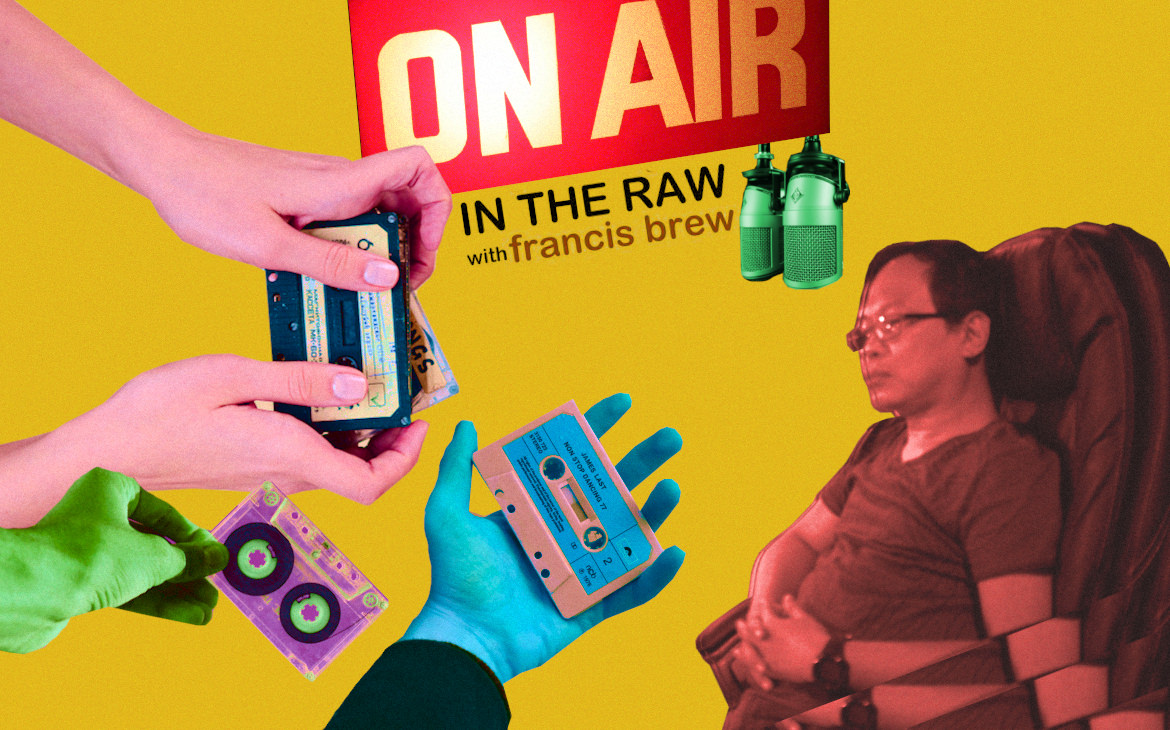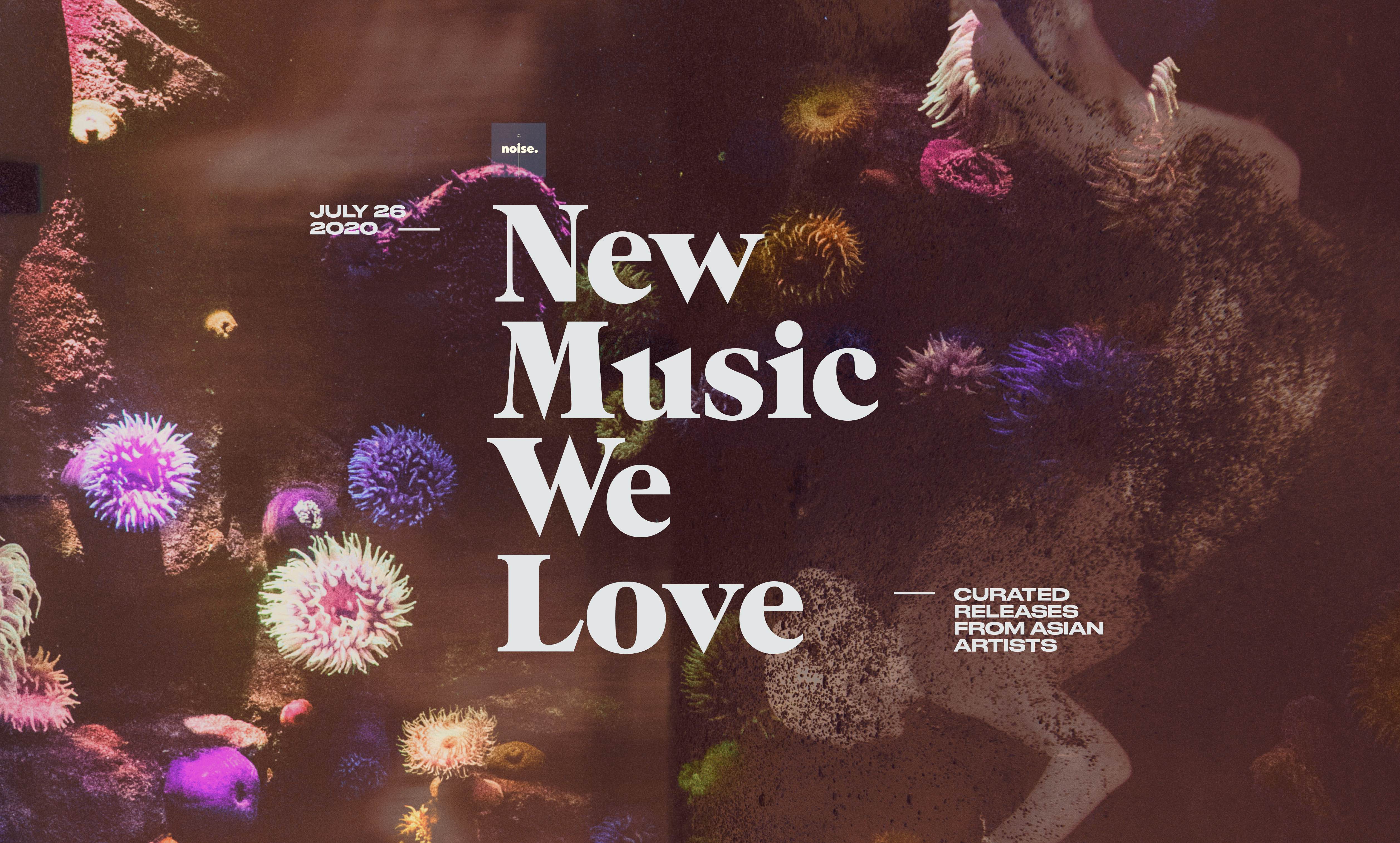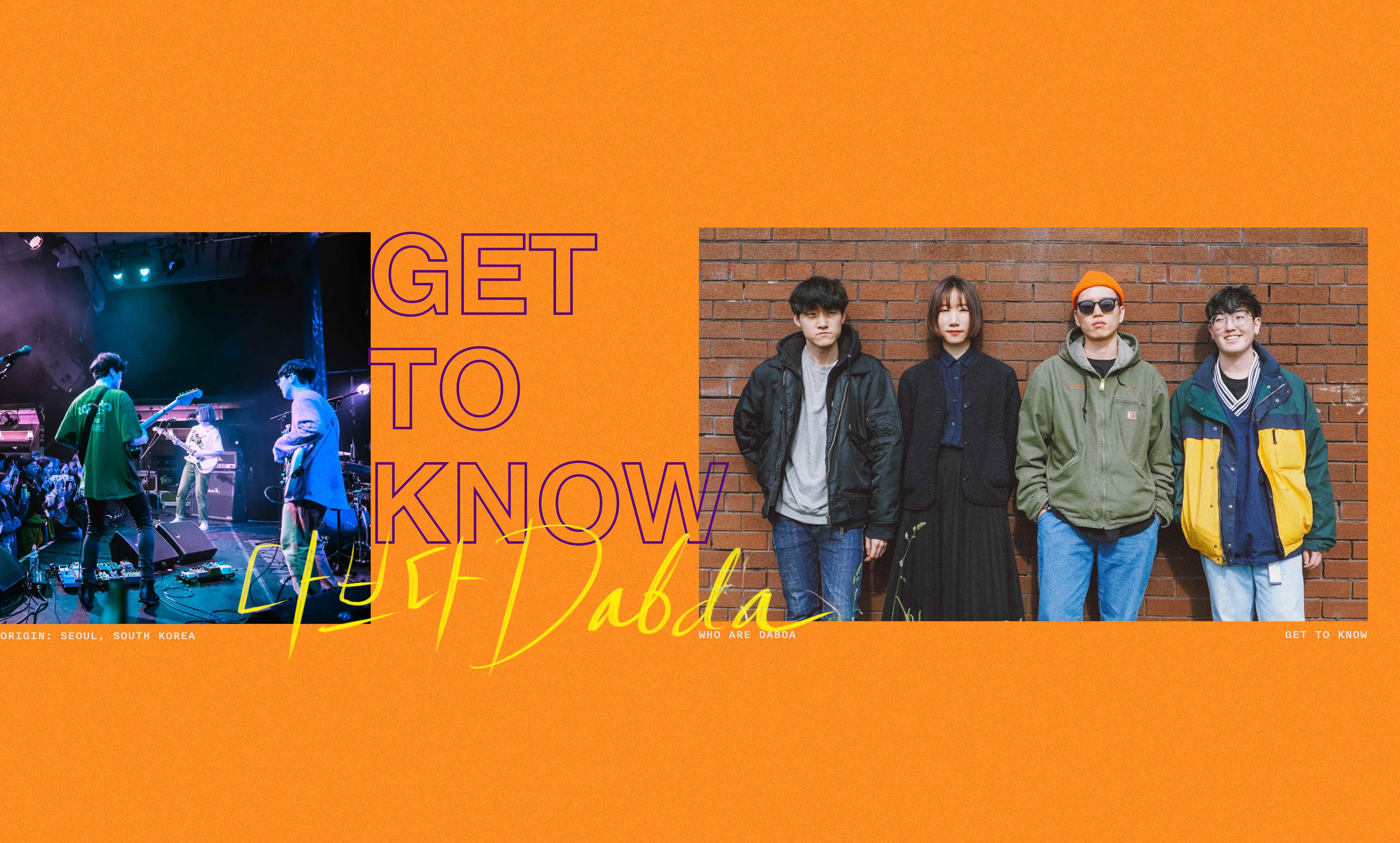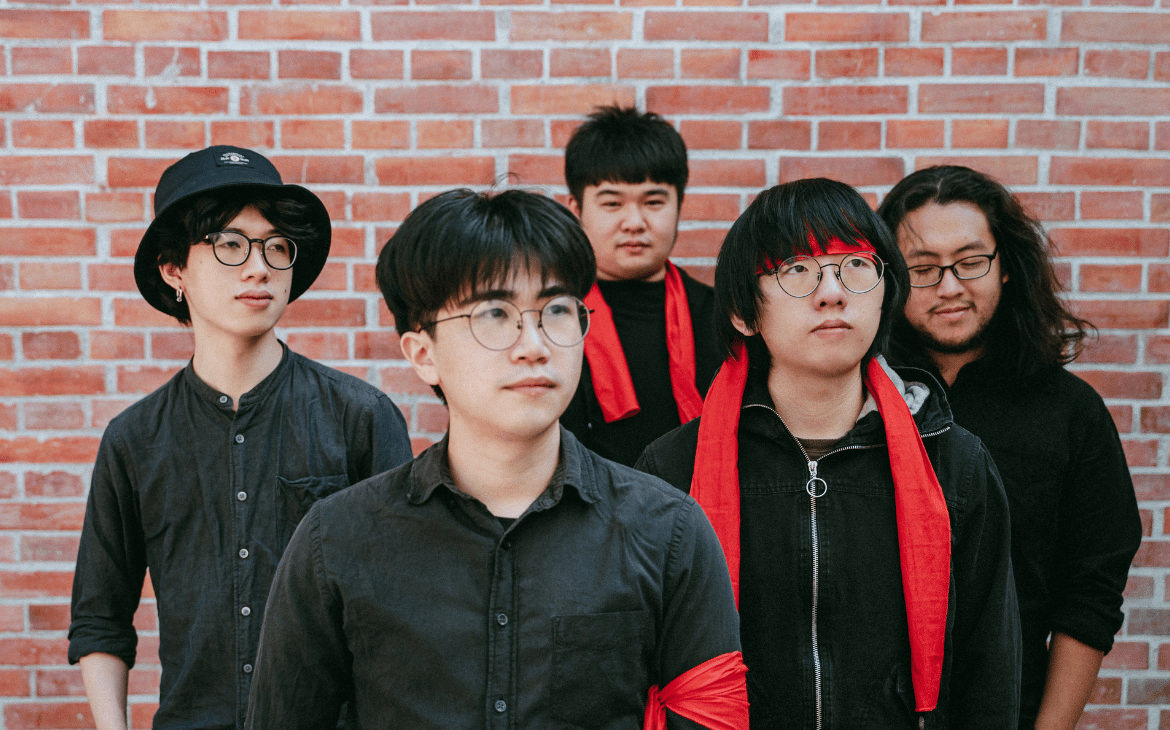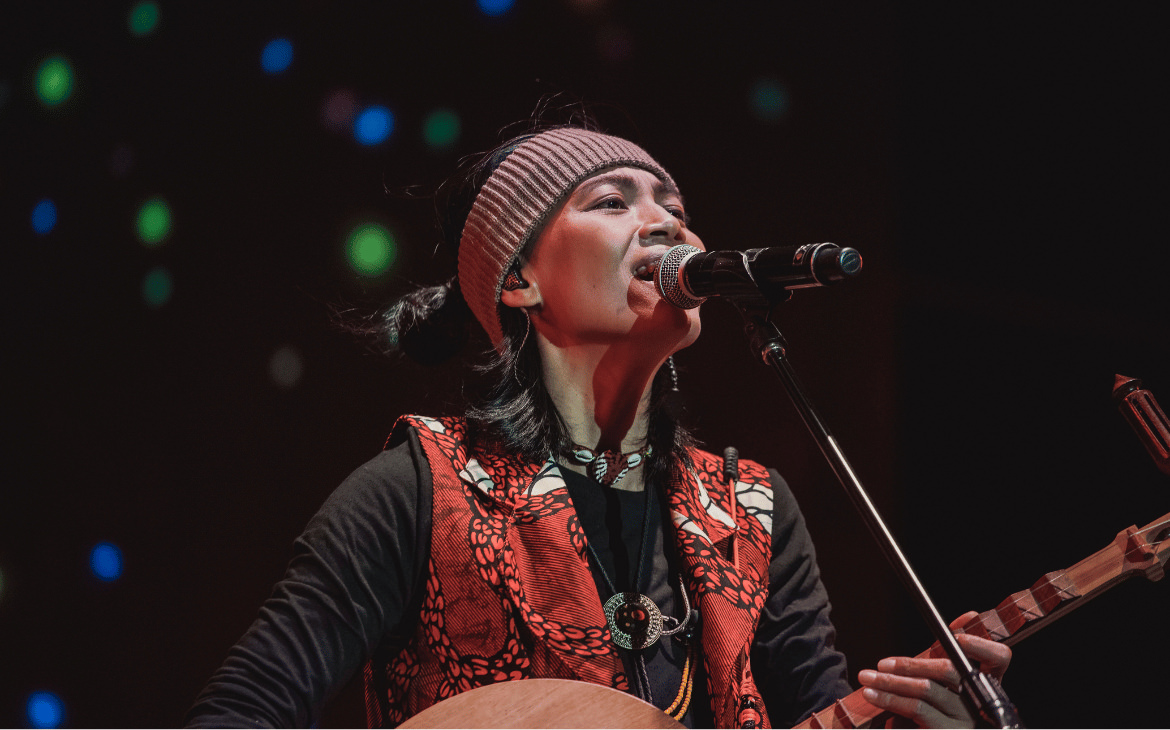On the indefatigable Francis Reyes and his well-loved (and equally detested) long-gone demo-review show, In the Raw, before it returns on air
Words by Aldus Santos
Illustration by MC Galang
Some ideas just sound awful right off the bat, until they’re not. Like installing a sleepy-sounding guitarist to host a radio show centered on critiquing godawful demos. Until they’re not so godawful. But how can that idea work? Sure, demos are interesting artifacts, but only when they’re your heroes’ demos. When Francis “Brew” Reyes said yes to mounting In the Raw for the late, great NU107, he knew he won’t be combing through The Beatles’ Anthology on a regular basis; he knew he’d be working the mailroom. Only a man who didn’t need more excitement in his life would find this attractive. And he’s pretty much seen it all (okay, he’s seen some of it at least); I mean, he’s from The Dawn, and, at the time of conception, also doing hired-gun work for P.O.T. and Joey Ayala. Surely a copywriting job for cable would be no skin off his nose. So why not another humdrum job, this time dissecting the frog cadavers of rock?
He forgets who made the call. He figures it’s NU station manager Ron Titular, or maybe program director Claire Miranda, either of whom saw the promise of discovery where there was otherwise clutter. It was the mid-‘90s, and the success of alternative was cajoling a whole new generation of slackers to pick up guitars and preloved Boss stompboxes. And we know this because, at the tiny rock station in question, mounds of unsolicited demos have started swelling into hills. You know that thing they say about junkyards? There’s treasure in there. And the NU bigwigs knew just the right scavenger. “Being an ex-NU DJ at the time and also an active musician, they figured I could host some sort of show that can feature demos from unsigned bands,” he says. I maintain this: in the wrong hands, at the mercy of someone illiterate and cavalier, the idea wasn’t going to fly. But soared it did with Kiko, and all of sudden, what used to be the big boys’ stomping grounds became a playpen for their lesser-known, snotty-nosed kid cousins. “I had radio experience as well, so that would minimize the need to train someone from scratch. I also had my foot in both sides of the industry, and they had faith that, yeah, I was the dude for it.”
It wasn’t necessarily the Peel Sessions, and it wasn’t Inside the Actors Studio either. But it was a pouncing everyone willingly subjected themselves to, and from then on, music criticism found an unlikely ally. I know artistic appraisal shouldn’t be the sole territory of practitioners—and that sound criticism is sound criticism no matter who’s churning it out—but Reyes approached the job with a respectful studiousness spiked with a dour librarian’s drawl. “Honestly, I wasn’t too confident about it. I mean, okay, we all have opinions about everybody else’s music, and [they thought] I was frank and critical. And I was, but only among friends.” Kiko’s discomfort about the whole enterprise was palpable. He was, after all, from the same tribe and traded in the same wares, and anything that was remotely detrimental to the success of his kind was to be looked down upon.
I maintain this: in the wrong hands, at the mercy of someone illiterate and cavalier, the idea wasn’t going to fly. But soared it did with Kiko, and all of sudden, what used to be the big boys’ stomping grounds became a playpen for their lesser-known, snotty-nosed kid cousins.
And that’s why he needed someone like Robbie Sunico by his side. Brash and verbose, the late Club Dredd co-founder’s judgmental sneer certainly pierced through the airwaves. “Man, he was brutal!” Reyes remembers, saying that while he was sympathetic to the plight of musicians because “I knew how difficult it can be,” Rob was more likely to pronounce, “Well, this is not going to work in a club!” This artist-critic double-life is no walk in the park, but spineless doublespeak just wasn’t going to cut it for the guitarist. “I was not as scathingly frank as he was, but I had to step up in that direction a bit.” And while hindsight has me disagreeing with much of this philosophy—that brutality equates to critical depth, and kindness signifies compromise—during that time, Kiko was forging a proto-masterclass path that was unheard of. It was, in essence, free consultation from a man with a storied musicianship. And it’s hard to say how that can be a bad thing.
When Robbie Sunico left the show, Brew found himself playing a sort of two-face routine. He’d be encouraging when a band showed promise, but instantly turn blunt when they proved to be mediocre. His criticism teetered on coaching, with the end goal of improving on the material while it was still in flux. His articulateness was a strength, but his generosity in spirit not quite. “I had to find that balance between critiquing the nuts-and-bolts of [musicianship] and songwriting, and also the general expressive and even emotive arc of a song or genre,” he confesses a decade after his host station took its last bow. “I try to forget about being a musician and listen as a music fan. We all started there and really still react [the same way anyway],” he shares. Perhaps Reyes’ reputation as a virtuoso instrumentalist preceded him unfairly, so he was cautious about not letting the scales tip over. He wouldn’t heap praises on a blazing solo that messed with the singer’s phrasing, for instance, but he also wouldn’t excuse sloppy playing just because a song had a great hook.
His criticism teetered on coaching, with the end goal of improving on the material while it was still in flux. His articulateness was a strength, but his generosity in spirit not quite.
During its peak years, In the Raw regularly yielded new music and fresh insight. But what those little unilateral workshops really did, to my mind, was show us that music consumption could be more nuanced. In short, we can chew on songs instead of just swallowing them whole. It ruffled more than a few feathers (and that in itself was a feat), but it put to light what we care for, and also what we’re willing to ignore, when we’re listening to music. Once, when he had Wilfrid Hernandez (a.k.a. Wolfmann) on, Kiko, despite his uncharacteristic love for electronic and DnB, said that he wasn’t “enthusiastic” about the late musician’s singing. To which Wilf replied, “But these are my songs. I know what’s best for them.” During another episode, after commending the songwriting chops of a bunch of unknowns called the Itchyworms, he said that an out-of-tune G string somewhere was bugging him. The stories are endless and the format was a runaway hit, but Brew remains cagey about the possibility of reprising the experience in this day and age. “Who the fuck wants to hear criticism from an old fuck?” he laughs, saying that the internet changed it all, and that because access is leveled, characters like him are viewed with equal parts distrust and disdain.
But good work deserves another turn, and after social media saw NU107 alumni reuniting for a livestream, eyes started darting in the direction of Brew’s old show. The short of it is it’s finally happening, in an updated form and with a little help from his friends (Kim Marvilla and her husband are poised to mount and co-present), and you have this to tide you over until he announces the details. “Maybe there are people who still value critiques. I know I’ve always been constructive, and I will never tell anyone to quit even if their songs are so-so,” he says. “God knows I’ve been told to quit when I was starting out.”

